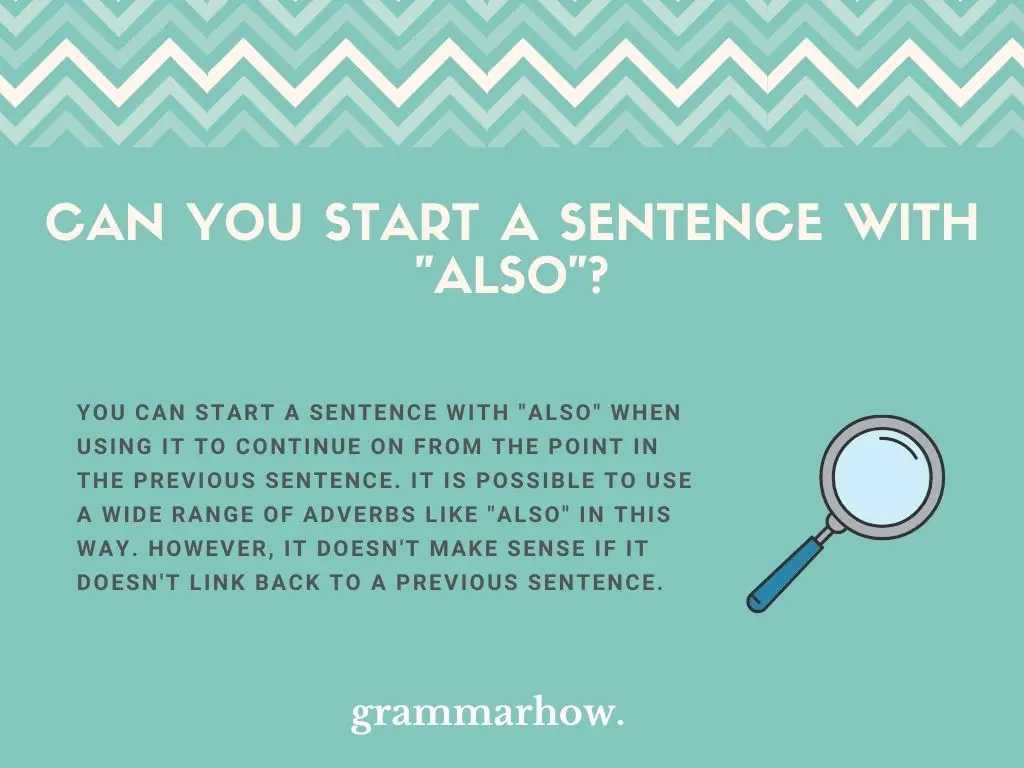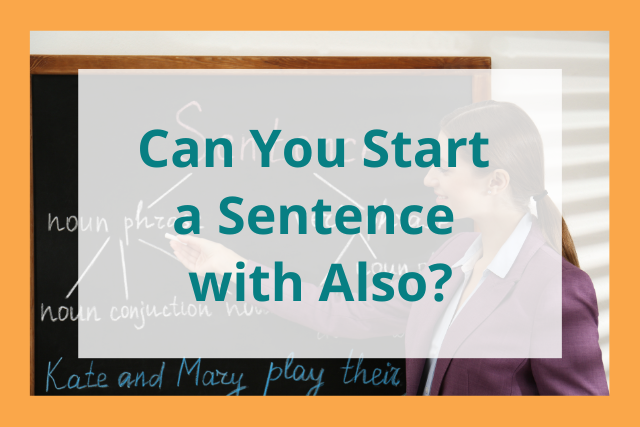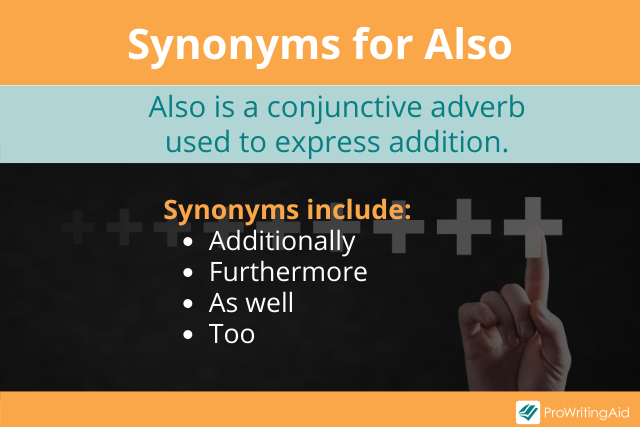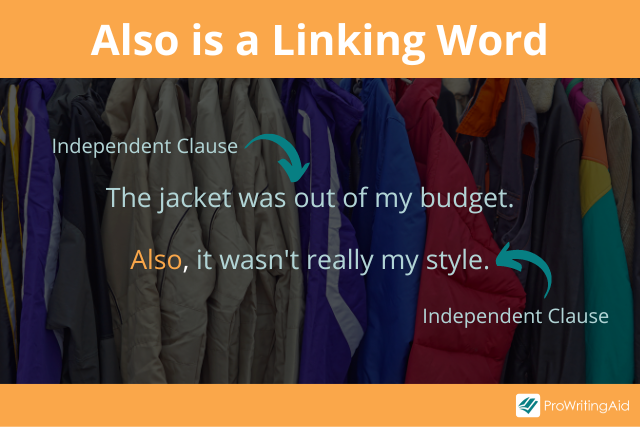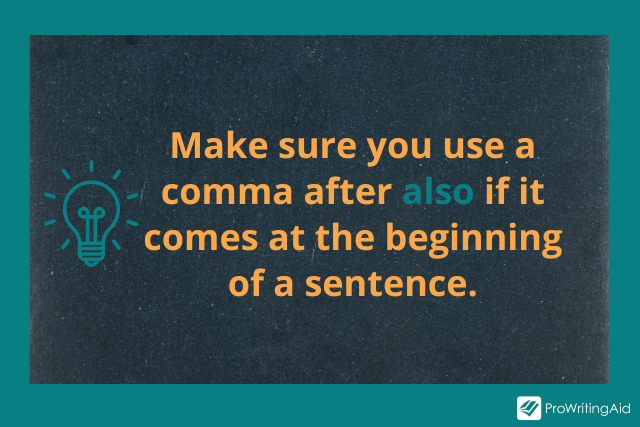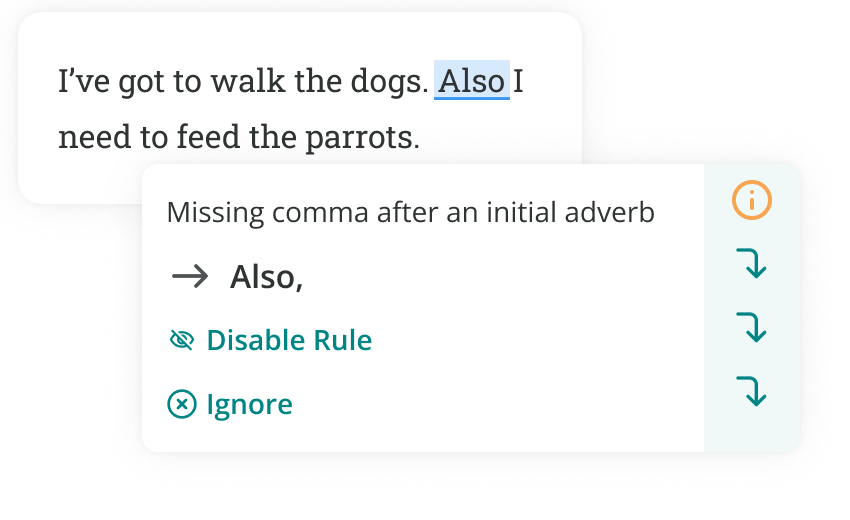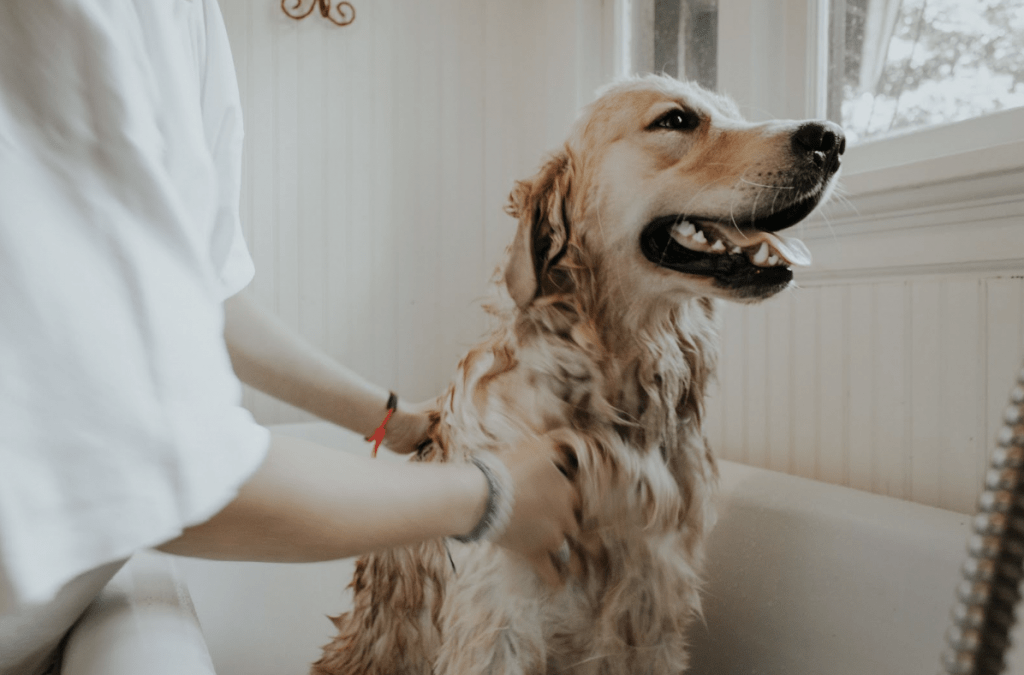There’s a common English language myth that teaches us how certain words cannot be used at the start of a sentence. While there are always exceptions, you can start sentences with more words than you realize. This article will look at starting a sentence with also.
You can start a sentence with “also” when using it to continue on from the point in the previous sentence. It is possible to use a wide range of adverbs like “also” in this way. However, it doesn’t make sense if it doesn’t link back to a previous sentence.
We typically use “also” at the start of a sentence to add more information. It works in the same way as you’d expect when we place it in the middle of a sentence, which helps us when it comes to explaining the intricacies of the word.
What Does “Also” Mean At The Beginning Of A Sentence?
So, why would we use “also” at the start of a sentence?
We simply use “also” in the same way we might use “and” or “furthermore.” It’s a continuation argument that helps us to elaborate on our point.
Most of the reason comes down to writing style. Sometimes, you might see the following sentence:
- He didn’t want to be there, and he wasn’t going to make it out, also he wasn’t sure whether it was worth his time.
While there isn’t anything strictly wrong with the above sentence, it’s far too lengthy. Many readers will back away from wanting to read a sentence like the above one.
Instead, you can do the following:
- He didn’t want to be there, and he wasn’t going to make it out. Also, he wasn’t sure whether it was worth his time.
Here, we’ve added a period before “also” and a comma after. This is correct punctuation for starting a new sentence with “also.” Remember, though; you must link back to the previous sentence and expand on the idea presented.
The following example won’t be enough on its own:
- Also, I had much to tell her.
Because there isn’t anything to link “also” back to.
Examples Of How To Use “Also” At The Beginning Of A Sentence
Some more examples will help you to get to grips with starting a sentence with “also.” Once you’ve read through these, you’ll be a master of the language rules surrounding it.
- He didn’t want to go and see her, so he thought he’d stay at home. Also, he’s probably not in her best books at the minute.
- We weren’t going to be there because we knew there was a lot to do. Also, it didn’t really strike us as a fun day out.
- You shouldn’t have come here because we now have to work twice as hard. Also, you’re never much use for the team.
- The government made a pledge to protect local wildlife. Also, they seemed to have taken more of an active stand on nature conservation.
- The teachers didn’t want to tell the children what to do for their homework. Also, the students weren’t exactly the easiest children to talk to.
“Also” works at the start of a sentence to continue on from the previous point. It works in the same way as “and,” but we use it at the start of a sentence when the previous sentence already has too many words or an extra clause in it.
Where Should I Place The Comma When Using “Also” At The Beginning Of A Sentence?
You might have noticed some of the punctuation rules already that come with “also.” You should learn how to punctuate it at the beginning of a sentence before using it and potentially getting it wrong.
You should place a comma after “also” at the beginning of a sentence. There are no other rules for comma placement, but you must always place a comma with no exceptions.
You can see that from the following examples:
- Correct: He didn’t want to go. Also, she wasn’t offering anyway.
- Incorrect: I didn’t have to be there. Also no one else did!
Without the comma, “also” doesn’t make sense. It’s supposed to add additional detail to the sentence to show us that there’s another point or thing that needs to be raised in the argument.
If we removed “also” from the sentence, the overall meaning should stay the same:
- Also, she wasn’t offering anyway.
- She wasn’t offering anyway.
Is It Informal To Use “Also” At The Beginning Of A Sentence?
Some people might be worried about the formality of using “also” in this way. While there are a few misconceptions surrounding starting sentences with words like “also,” does that mean they’re not formal?
There is nothing wrong with starting a sentence with “also” in both formal and informal writing. However, it’s more likely that you’ll come across it informally since there are better formal options.
You might prefer a formal alternative such as “furthermore.” This is much more common in most formal pieces of writing, especially when introducing an idea that you want to engage the readers with.
There are plenty of other options too, which show that “also” isn’t the best choice. However, “also” isn’t an informal word, which is why it’s possible to use it no matter what tone you’re writing with.
The only issue you might come across is the rarity of starting a sentence with “also.” It’s not something that’s done often. Most people would prefer a simpler “and” in place of it (even with formal writing).
Alternatives To Starting A Sentence With “Also”
Finally, let’s go over some alternatives to starting a sentence with “also.” The synonyms that we’ll highlight here can all start sentences in similar ways, so they make for excellent replacements instead of “also.”
- And
- Furthermore
- Surely
- Besides
- Not to mention
- Without forgetting
- To add
- In addition
- Along with that
- Don’t forget
These synonyms are all potential replacements for “also.” “Furthermore” is the best formal choice, while “and” is the best informal choice (though they are both interchangeable as well).
Martin holds a Master’s degree in Finance and International Business. He has six years of experience in professional communication with clients, executives, and colleagues. Furthermore, he has teaching experience from Aarhus University. Martin has been featured as an expert in communication and teaching on Forbes and Shopify. Read more about Martin here.
1 Wahtever a man sow, that shall he also reap.
2 No answer is also answer.
3 Where theren is a flatterer there is also a fool.
4 Modesty is not only and ornament, but also a guard to virtue.
5 There is also a golf course five miles away.
6 Times of great change are also times of uncertainty.
7 The rehearsal process also irked him increasingly.
8 We also went to see the film.
9 Sulphur is also used to sterilize equipment.
10 He has also appeared in pantomime.
11 Thank you, so busy,[www.Sentencedict.com] also come to hurt me.
12 Examinations also lower the standards of teaching.
13 Stern also studies and observes the behaviour of babies.
14 The three sons also contribute to the family business.
15 Time may also be wasted in purposeless meetings.
16 Where I am there you are also.
17 I feel exhausted, but also triumphant.
18 He also deleted files from the computer system.
19 In life, then boring time, also are limited edition.
20 The scheme is also open to non-members.
21 Although again sweet candy, also has a bitter day.
22 The birds also attack crops when the opportunity arises.
23 Know, how again recover also just air.
24 An historical awareness also imparts a sense of continuity.
25 Britain’s unsettled political scene also worries some investors.
26 As a modern parent, I know that it’s not how much you give children those counts, it’s the love and attention you shower on them.A caring attitude can not only save you a small fortune, but also even make you feel good about being tight-fisted and offering more care than presents.
27 Although the world is full of suffering, it is full also of the overcoming of it.
28 When an end is lawful and obligatory, the indispensable means to is are also lawful and obligatory.
29 A nation reveals itself not only by the men it produces but also by the men it honors, the men it remembers.
30 Words and deeds are quite indifferent 23modes of the divine 24energy. Words are also action, and actions are a kind of words.
Many people wonder if the English language accepts sentences starting with also.
Can you start a sentence with also? The answer is yes! It’s perfectly okay to start a sentence with also in both formal and informal writing, as long as that sentence continues the same train of thought as the previous sentence.
Read on to learn more about how to use also to start sentences.
How to Use Also in a Sentence
Also is a conjunctive adverb that is used to express addition. Common words with similar meanings include additionally, and, furthermore, as well, and too.
Let’s take a closer look at how to use also correctly, both at the beginning of a sentence and in the middle of one.
Using Also to Start a Sentence
When you use also at the beginning of a sentence, it functions as a linking word to connect that new sentence to the previous one. It adds a new idea that builds on the previous idea and makes it clear the two ideas are related.
For example, imagine you’re trying to explain to someone why you didn’t buy a jacket you tried on at the store.
Your first sentence might be: “The jacket was out of my budget.”
Your second sentence could be: “Also, it wasn’t really my style.”
In this case, the word also links the expensiveness of the jacket to the fact that the jacket wasn’t your style. Using this linking word makes it clear that these two sentences are both contributing to the same point—the explanation for why you didn’t buy the jacket.
It’s important to remember that using also at the start of the sentence can make that sentence feel like an afterthought.
In the example above, the fact that the jacket wasn’t your style feels less important than the fact that it was out of your budget, because you started the second sentence with also.
As a result, you should be mindful about using also to start a sentence in scientific writing, since it might weaken the sentence, even though it doesn’t break any grammar rules.
Using Also in the Middle of a Sentence
When you use also in the middle of a sentence, it means the same thing as in addition or as well. Here, the purpose of also is to join two words or phrases together.
You might say, “The girl was sad, lonely, and also hungry.” This sentence means the same thing as the following sentence: “The girl was sad, lonely, and hungry as well.”
In some scenarios, you can use also in the middle of a sentence to link that sentence to the previous one, just like when you use also at the beginning of the sentence.
For example, you might say, “Einstein was a brilliant physicist. He was also a talented violin player.” These two sentences could be combined and rewritten as: “Einstein was a brilliant physicist. Also, he was a talented violin player.”
Examples of Starting a Sentence with Also
The best way to learn grammar is by reading plenty of examples. Here are some more examples of sentences that begin with also.
- It’s important to stay hydrated while you’re at the beach. Also, make sure to apply sunscreen to protect your skin.
- I didn’t go to the dance because I didn’t have a date. Also, I hate dancing.
- Mom needs you to run to the grocery store because we’re out of milk. Also, can you get some strawberries while you’re there?
- My best tip for succeeding as a writer is to practice writing as often as you can. Also, read lots of books.
- I want to get a dog because it would make me feel less lonely when I’m alone in the house. Also, dogs are cute.
- My daughter is on the varsity tennis team. Also, she plays soccer at the local park.
- Don’t forget to lock the door when you leave. Also, turn off all the lights in the house, so we don’t waste electricity.
How to Use Also to Start a Sentence
If you use also at the beginning of a sentence, you should make sure that sentence relates to the previous sentence or adds another point to the same overall idea.
If not, readers will be confused about the inclusion of the word also, since its purpose is to link two thoughts together.
Make sure you use a comma after also if you use this word to start a sentence. You don’t always need a comma if also is in the middle of the sentence, but it’s always proper punctuation to use one if it’s at the beginning.
Conclusion on Can You Start a Sentence with Also?
So there you have it! Starting a sentence with also is grammatically correct. Just make sure you’re building on the previous sentence, and that you use a comma.
Also, don’t forget to run your work through ProWritingAid to check for grammar errors! ProWritingAid can detect missing commas when you start sentences with linking words like also or and.

Also has the same meaning as ‘as well’ and ‘too’.
It can go in lots of different places in a sentence. However, any change in its position will also change the meaning and emphasis of the sentence.
Have a look at these example sentences. They are all grammatically correct, but they don’t have the exact same meaning.
Also, I think that you should quit smoking. (The speaker has made some other suggestions as well.)
I also think that you should quit smoking. (The speaker is not the only person who wants the listener to quit smoking. Somebody else has already expressed that opinion.)
I think that you also should quit smoking. (The speaker has already asked some people to quit smoking. Now he also wants the listener to quit smoking.)
I think that you should also quit smoking. (Smoking isn’t the only thing you need to quit. You have to quit a few other things as well.)
Generally speaking, also should go before the word or expression it modifies.
The use of commas can also change the meaning of the sentence. Study the examples given below.
I also think that she is the most deserving candidate. (This sentence seems to suggest that the speaker has already told you something else they think.)
I, also, think that she is the most deserving candidate. (This sentence suggests that somebody else has already expressed this opinion.)
We use also to add information to something we have already said. And we place it in the sentence next to the thing or idea.
When it comes to our writing, we don’t often know all the rules. This is especially true when it comes to starting sentences with different parts of speech. We also do different things and follow different rules when we speak versus when we write, and the two can get carried over. With all that in mind, we’ll discuss whether or not you can start a sentence with also.
Also is one of those great, overused words that helps to link sentences together. It’s a highly useful little word, which technically means, in addition, and can get rid of any potential fragmented sentences when it’s placed between two sentences, tying the information together neatly and creating a coherent thought.
What is also?
Before we jump right into how and when to use it, we should just quickly explain what also is. Also is a conjunctive adverb. An adverb is a word that modifies an adjective or verb. It helps to give a relation of place, manner, cause, time, and the degree to the rest of the sentence. In short, it gives you the word to describe things.
Now, let’s get on to also and where it can be put in a sentence.
Starting a sentence with also
It is acceptable to begin a sentence with also. You’ll find it a widespread occurrence, even in scientific writing. As we mentioned, it helps to join thoughts together, so it is useful in science when trying to make cohesive links between sections.
For example, the first sentence could be:
Our research demonstrates that dogs like food.
Second sentence:
Also, they like to be hugged.
By placing the also at the start of the sentence, these two separate pieces of information are now linked together. Be aware though; you’ll need to add a comma directly after the also when beginning a sentence in this manner.
Why shouldn’t you start a sentence with also?
One of the main reasons you might have been told not to start a sentence with also is because it can make the writer sound disorganised. It can make the sentence that follows also seem like an afterthought.
Example:
Also, the dog wanted food.
This is commonly something we use in speech rather than writing and where it can trip us up. In writing though, readers might spend some time trying to figure out what the rest of the sentence was relating to, rather than moving on with the reading. So, be careful!
Inverted sentences and fronting
There are other times when also might appear at the start of the sentence. This will be in cases where the verb appears before the subject.
Example:
Also enclosed are the tickets.
Fronting, which is placing a word or a phrase in front of the sentence when it should be on the latter part, is often used in more formal writing. This also triggers inverted sentences, in which adverbs start the sentence:
Example:
Also important is the dog’s health.
This sees also accompanied directly by an adjective and is also entirely correct in its usage.
Should you also start a sentence with also?
Using also at the start of a sentence, whilst sometimes being frowned upon in formal writing, is okay if you are continuing a train of thought. Issues arise if the thought is fragmented and unrelated to the rest of the information present. It’s also slightly more informal than some of the other words such as furthermore, which can be used instead. Similar to other grammar issues, try and avoid using it in consecutive sentences. Otherwise, the result will be choppy.
Now that you have learnt when you can start a sentence with the word also, it’s time to use your skills in practice. Sign up to become a freelance writer with our content writing company and earn money writing content! Become a part of our writers’ community providing our clients content writing services.
All are grammatically correct, but can have slightly different meanings.
You also are allowed to see your son.
This could mean that in addition to other things that you are allowed to do, you are allowed to see your son. Depending on context, it could mean that in addition to others being allowed, you are too. E.g. «Your son’s wife is allowed to see him. You also are allowed to see him.»
You are also allowed to see your son.
Pretty much the same as the previous. We would be less likely to use this form to say #2 above, i.e. that you are allowed along with others who are allowed. This would more likely mean #1, in addition to other things, you are also allowed, etc.
Also, you are allowed to see your son.
In addition to other things, you are allowed to see your son. This differs from the first two in that it can be used when the other things are not permissions, while the first two would generally be used only to discuss several different permissions. That is, for example:
You are allowed to have a lawyer present during questioning. You are also allowed to see your son.
Versus:
Your deposit will be refunded. Also, you are now allowed to see your son.
Finally,
You are allowed to see your son also.
This one is most different. It would normally be used if there are specifically others that you are allowed to see, and your son is one of those. Like, «You are allowed to see your daughter. You are allowed to see your son also.» You wouldn’t use this form with other permissions or with other things that are not permissions.
But note that if you put a comma between «son» and «also», then it becomes the same as «Also, you are …»
Many of your teachers have probably explained that you should only start sentences with certain words or parts of speech. Conjunctions have always been a no-no, but what about adverbs?
You can start a sentence with the adverb “also.” It is specifically a conjunctive adverb that we use to connect two independent clauses. “Also” indicates the addition of something, so when you use it to begin a sentence, it shows the relationship of the two clauses where one adds to the other.
Many people think adverbs are just words that modify adjectives or verbs differently. However, there is much more to them and how we use them in a sentence. Read on to find out more.
What Does “Also” Mean?
“Also” means “in addition” or “too.” We use it to add information to a previous clause or indicate the repetition of something someone said previously. It can appear within a sentence or at the start of a new one.
Example sentences:
- I have to pack up the whole house and also get ready for the arrival of a new baby.
- Mr. Darcy may have been proud, but he was also kind.
- I’m going to the housewarming, and Mary said she would also be attending.
“Also” is a conjunctive adverb, which means that, like a conjunction, we use it to connect two independent clauses. This causes it to function more like a subordinating conjunction, showing the relationship between the two clauses (source).
Example sentences:
- The magician showed everyone his hat. Also, the stage was quite empty.
- I kept my eyes down to avoid someone noticing me. Also, I was afraid.
- They walked for hours under the hot sun. Also, they were exhausted.
The previous examples show that “also” provides additional information. It creates an emphatic effect primarily but can also appear at a different point in the sentence. If you want to give more information but make it stand out, use “also” to start the next sentence.
How Do You Use “Also”?
Using “also” depends on the purpose of the sentence. Suppose you are using it to provide general additional information. In that case, you can use it at any logical point in the sentence. If you are using it for effect, it should appear at the start of a new sentence.
Using “also” as part of a sentence only provides additional information. It can also mean “as well as” or “too,” so it can agree with the previous part of your sentence.
Example sentences:
- The movie was great, and it also had my favorite actor!
- We have 10 fingers, and we also have 10 toes.
- I didn’t think we were also in danger, but they were coming for everyone.
When you use “also” at the start of the sentence, it should appear with a comma directly after the word. This creates a pause in the sentence, emphasizing the next part as necessary. When you use it without a comma in the middle of a sentence, the sentence remains declarative.
Example sentences:
- He’s coming over tonight and also bringing his girlfriend.
- He’s coming over tonight. Also, he’s bringing his girlfriend.
- They were born on the same day, at the same hour, and also in the same hospital.
- They were born on the same day at the same hour. Also, it was the same hospital.
Syntax with adverbs requires a lot of thought. Read “Which Is Correct: Not Yet or Yet Not?” to help you understand word order and how exactly to assemble sentences.
As you’ve seen in the previous sentences, the function of “also” does not change — it continues to provide additional information. But the addition of the comma does create a dramatic stop that makes the sentence after it more emphatic.
When Can You Use “Also”?
You use “also” when you wish to provide extra information or state that something or someone is doing the same action as the previous subject. “Also” has to appear next to the clause for which it provides extra information; this can be part of the same sentence, as a secondary clause, or as a separate sentence.
When “also” appears in the middle of the sentence, it should generally appear just before the main verb.
Example sentences:
- She looked terrific, and he had also worn his formal suit.
- Is Joseph also worried about his looks?
- You’re writing a book? I’m also writing one!
However, we use “also” after when there is an auxiliary verb. If a sentence has two auxiliary verbs, then “also” should only appear after the first one.
Example sentences:
- She looked amazing, and he also dressed up for their fancy date night.
- Different holiday destinations are also in the pamphlet.
- In this class, you will also be working on your pottery pieces.
There are occasional exceptions, especially when describing something or someone with an adjective or directly referencing the object itself.
Example sentences:
- Not only was he caring, but he was also great at cooking!
- I’m also his friend, so he should have invited me.
- There is also a weekly newspaper released in the small town.
When “also” appears at the start of a sentence, you can then follow it with the rest of the independent clause, as long as it has a comma right after.
In What Context Can You Use “Also”?
There is no specific context where “also” should be the only word you use. Its purpose is to contextualize extra information. Hence, you should use it to tell your audience more about something.
You can use “also” in formal and informal writing and verbal communication.
“Also” works for many different scenarios. It is more likely to appear in a written text than in spoken communication because we prefer the simpler adverb “too” while speaking.
Because it has a similar meaning to “as well” and “too,” you can use “also” to express these ideas when showing the relationship between two clauses. “Also” does not fall under the usual adverb types like manner, degree, or frequency.
“Also” is a conjunctive adverb. It functions as a conjunction while telling us that the second part of the sentence or clause relates to the first by providing extra information. Another conjunctive adverb that provides additional information is “in addition.”
There are a few scenarios where you may want to provide extra information. One of the ways to do this is through a list, but when you want to emphasize a point, then using the adverb “also” sets apart the additional information to make it more noteworthy.
Example sentences:
I bought everything for the tacos: beef, peppers, lettuce, and cheese.
I bought everything for the tacos. There’s beef, peppers, lettuce, and also some cheese.
Edward was the King of the United Kingdom and the Emperor of India.
Edward was the King of the United Kingdom. Also, he was the Emperor of India.
As you can see, the addition of “also” is not always necessary, and there are other ways to provide additional information, but it does provide a more emphatic element to that information.
When Not to Use “Also”
You should never place “also” at the end of a clause. We use “too” and “as well” instead at the end of the sentence. We only use “also” in positive statements because there are other words that function better in negative statements.
Because we use “also” to provide extra information, and the assumption is that the extra information follows the conjunctive adverb, you cannot place “also” at the end of a sentence because there is no other information that follows.
We have already discussed where you should place “also” within a sentence. However, there are specific points where its usage is definitely incorrect.
If you do wish to indicate that there is additional information at the end of the sentence, then “too” or “as well” are grammatically accurate synonyms that you can use instead of “also.”
Example sentences:
- I bought the tickets, and I also booked the limo for our prom.
- I bought the tickets and booked the limo for our prom as well.
- I bought the tickets and booked the limo too!
You cannot use “also” as part of a negative statement. This is because additional information in a negative form uses “either,” “nor,” or “neither.” For example, the sentence “I don’t have a good relationship with my brother and also with my sister” is incorrect.
Example sentences:
- I don’t have a good relationship with my brother, nor with my sister.
- I’m not coming to the party, and neither is he.
- They’re not under pressure, and they’re not fine either.
If adverbs mix you up, you may be interested in an article discussing the difference between “well” and “good.” Read “Doing Well or Doing Good: Can Both Be Correct?” to understand when you should use these specific words.
What Can You Use Instead of “Also”?
“Also” has several synonyms that you can choose from. As we’ve mentioned previously, “too” and “as well as” are common synonyms with similar meanings.
Example sentences:
- I wanted to help them, but everyone in the town wanted to help as well.
- Since my sister rejected him, I told him I had a cousin, too, who might be interested.
- As well as his younger sister, he had many older brothers.
Other words and phrases that we can use instead of “also” are “additionally,” “furthermore,” and “moreover.” Their connotation is somewhat formal, though, so we cannot use these as perfect synonyms.
Example sentences:
Furthermore, she informed him about the problems before he signed the lease.
Additionally, we believe this is an entirely new discovery that will revolutionize modern medicine.
Moreover, we are waiting for her response to continue the acquisition.
On the other hand, there are decidedly less formal synonyms, and we are more likely to use them in verbal communication instead of written. Phrases like “on top of that” and “over and above” are examples.
Example sentences:
- Not only did I get a new phone, but I also got a new smartwatch on top of that.
- Over and above, we are fighting for the end of the war.
Not all of these phrases are perfect synonyms, but they all suggest the same idea; hence, they are all viable alternatives you can use instead of “also.”
Using “Also” in a Full Sentence
As we’ve discussed, we can use “also” in a variety of ways. We can use “also” to provide extra information and set off a statement providing additional information.
When it appears in the second clause, it provides additional information to the initial clause. When it appears in a clause on its own, some context does need to be provided to explain the additional information.
Example sentences:
- I enjoyed sitting on the beach, but we also went swimming every day.
- Even though things seem bleak, there is also kindness and good in the world.
- Jenny is also my boss.
In the final sentence, we assume that there was some kind of discussion about bosses that prompted this utterance about Jenny being someone’s boss. “Also” also helps to focus the reader’s attention.
Focusing Adverbs
“Also” is a focusing adverb. Others know it as an adverb of focus or focus adverb. A focus adverb is an adverb that sets apart a clause or makes it more obvious. It generally points to verb phrases, although it can also work for other phrases like nouns, prepositions, adjectives, and adverbials.
As a standard adverb, “also” appears in the middle of the sentence. It gives us more information about the clause, telling us who, where, or what is also doing something (source).
Example sentences:
- She wasn’t impressed, and it seemed like she had also lost her sense of humor.
- I also go running every week.
- While I was there, I also met a celebrity chef. Her food was amazing!
As a focusing adverb, “also” brings the reader’s attention to a specific clause. We often use it for effect, both serious and humorous. “Also” is not the only focusing adverb. Other focusing adverbs include “especially,” “just,” “only,” and “particularly” (source).
Focus adverbs can both limit and add to the sentence. “Just” and “only” are examples of limiting focus adverbs, while “also” and “as well” are examples of additive adverbs. This article was written for strategiesforparents.com.
Example sentences:
- He only wanted to go to the party.
- Just Shawn will be coming to the party.
- Also, Leah is bringing the snacks for the party.
- I’ve hired a clown for the party, as well as organizing the cake.
Final Thoughts
“Also” is one of the more common adverbs in the English language. We use it in both written and verbal communication, and it has an important function: providing additional information. Especially in our time, additional information is key for positive, clear communication.
As a focusing adverb, “also” sets off a statement or idea. When we use it at the start of the sentence, it draws the reader’s attention and emphasizes your point.
- Вопрос
Где в предложении должно стоять наречие «also»?
Hydar, Iran
- Ответ
Hello — thanks for writing in. This is a good question but I’m afraid it’s got a difficult answer: grammatically, also can be put in lots of different places in a sentence, but changing its place will also change the meaning and emphasis of the sentence.
Привет, спасибо, что обратился к нам (написал). Вопрос хороший, но боюсь, что ответить на него сложно: грамматически для «also» мест в предложении может быть много, но в разных местах оно придаёт предложению разные оттенки смысла.
First of all, let’s discuss the role of also – what does it do? Well, it helps us to join two ideas together. It has the same meaning as ‘too’ or ‘as well’. As far as the placing of also is concerned, have a look at these example sentences which are all grammatically correct:
Прежде всего, обсудим, какова роль наречия «also» — что оно делает? Оно помогает нам соединить вместе два высказывания (идеи). Его синонимами являются слова «too» или «as well». А вот место в предложении может быть разным. Взгляните на следующие предложения, все они грамматически правильны:
1. Also, I think that you should consider quitting your job.
Я тоже думаю, что тебе нужно задуматься о том, чтобы уволиться с работы.
2. I also think that you should consider quitting your job.
А ещё мне кажется, что тебе нужно задуматься об увольнении с работы.
3. I think that you also should consider quitting your job.
Думаю, тебе тоже нужно задуматься об увольнении с работы.
4. I think that you should also consider quitting your job.
Думаю, тебе нужно также подумать и об увольнении с работы.
5. I think that you should consider also quitting your job.
Думаю, тебе нужно задуматься ещё и о том, чтобы уволиться с работы.
6. I think that you should consider quitting your job also.
Думаю, что помимо прочего, тебе нужно подумать и об увольнении с работы.
That’s right, it can go in lots of places! As I said before, changing the position alters the emphasis and meaning of the sentence. As it is an adverb, it’s probably most commonly used next to a verb, but as you have heard, this isn’t fixed if you particularly want to stress another part of the sentence. Basically, you put also next to or as close as possible to the word that you are highlighting.
Вот именно: «also» может стоять в самых разных местах предложения. Я уже говорила, что изменение его места меняет и оттенки смысла предложения. Поскольку «also» — наречие, то его наиболее вероятное место — после глагола. Но вы уже знаете, что это место не фиксировано: при вашем желании вы можете подчеркнуть и другую часть предложения. Общий принцип: «also» надо ставить как можно ближе (или сразу после) слова, которое вы хотите подчеркнуть.
Another important thing to note is that the use of commas (when written) or pauses (when spoken) can again change the meaning of the sentence. Compare these:
Ещё важно отметить, что использование запятых (в письме) и пауз (в речи) тоже может изменить смысл предложения. Сравните предложения:
a) I also think that it is very expensive.
а) К тому же я считаю, что это очень дорого.
b) I, also, think that it is very expensive.
b) Я, как и ты, думаю, что это очень дорого.
Which one of these implies that the speaker has already told you something else they think? The answer is (a) I also think that it is very expensive. Sentence (b) I, also, think that it is very expensive suggests that someone else has already expressed this opinion.
Какое предложение из этих двух указывает, что говорящий раньше уже что-то говорил вам о своих мыслях (и теперь добавляет в ним)? Это предложение (a) I also think that it is very expensive (К тому же я считаю, что это очень дорого). Предложение (b) I, also, think that it is very expensive (Я, как и ты, думаю, что это очень дорого) наводит на мысль, что раньше своё мнение уже выразил другой собеседник.
Basically you need to remember that we use ‘also’ to add information to something we have already said and you need to place it in the sentence next to the thing or idea that you are adding. I hope this makes it clear!
Самое главное — надо помнить, что «also» добавляет информацию к чему-то ранее сказанному и помещать его надо как можно ближе к слову, к которому «also» добавляет информацию. Надеюсь, что смогла это объяснить!
Amy Lightfoot
Страницы:
Указатель изучаемых английских слов и словосочетаний:
A, B
C, D
E, F
G, H
I, J
K, L
M, N
O, P
Q, R
S, T
U, V
W, X
Y, Z
|
|
||||||||
|
||||||||
|
Copyright © 2015 ENGLISHCOLLOCATION.COM TERMS OF USE | CONTACT | PRIVACY POLICY |

